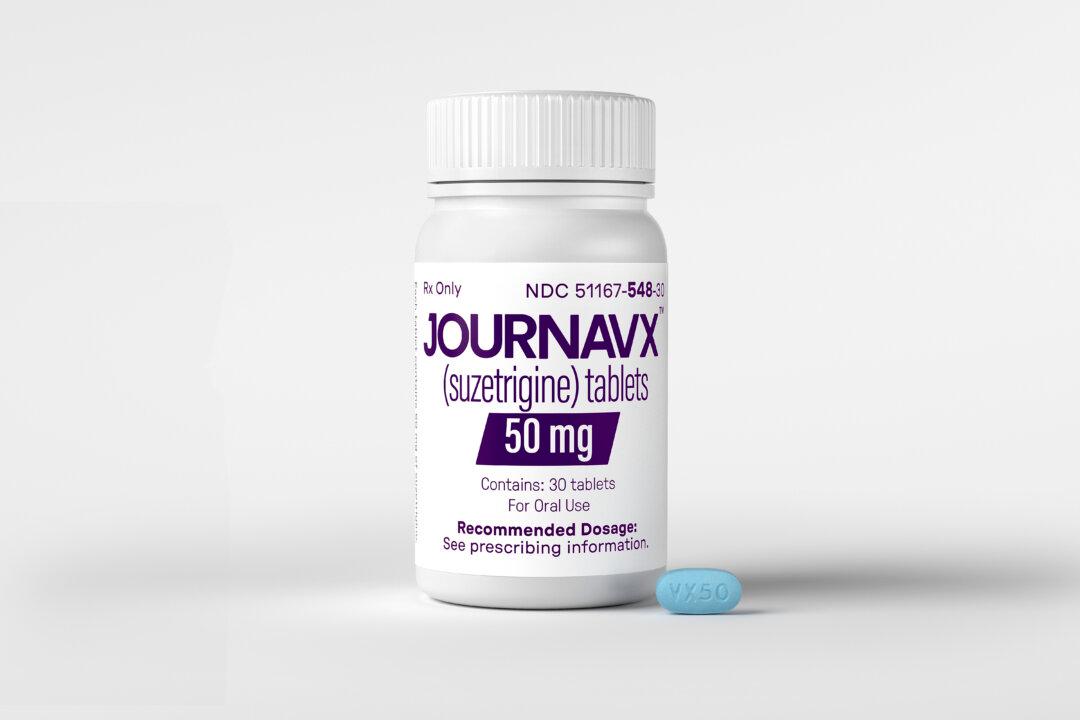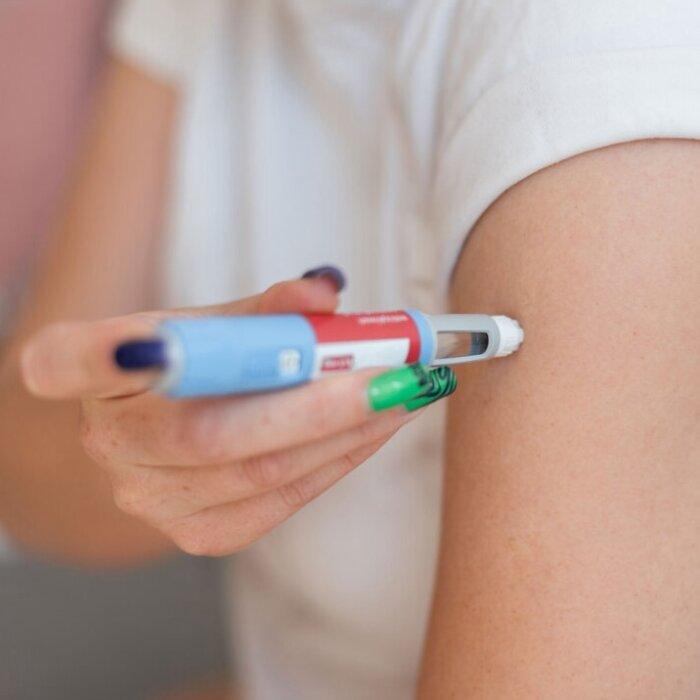Good morning, and welcome to The Epoch Times Health Brief for Sunday, February 9, 2025. I’m Bill Thomas, we have some intriguing stories to share with you right now, and here’s what’s going on.
For the first time in two decades, the FDA approves a new type of non-opioid pain reliever; troubling information to share with you regarding microplastics and the human brain, and here in the United States, research says the leading cause of death, heart disease, kills someone every 34 seconds.
Also, a new study shows that across the country, young adults are dying at unprecedented rates, and if you can’t help scratching that irritating itch, don’t worry—you may actually be helping yourself out, and we’ll break it all down for you.
FDA Approves First New Type of Non-Opioid Pain Reliever in Decades
The Food and Drug Administration (FDA) has just given its seal of approval to a pill called Journavx for treating moderate-to-severe acute pain in adults, and it’s the first drug of its kind to be approved in more than 20 years.The new drug reduces pain by blocking signals in certain parts of the nervous system. This is unlike opioids, which relieve pain by binding to receptors on nerve cells in the brain, and which can potentially lead to addiction.
The FDA says their approval was based on two randomized trials involving nearly 900 adults who suffered with acute pain following abdominoplasty—which is also known as a “tummy tuck”—as well as from bunion surgery. These trials showed that the drug significantly reduced pain compared to a placebo.
The FDA says that their approval of Journavx provides patients with a different treatment option, offers an opportunity to mitigate certain dangers associated with using opioids, and underscores their commitment “to approving safe and effective alternatives to opioids for pain management.”
Vertex Pharmaceuticals, which makes the drug, says that it’s been approved for twice-daily use in treating adults with acute pain and that it will cost more than $15 for each 50-milligram pill.
Some common side effects reported by patients during the trials include itching, muscle spasms, and rashes. Vertex warns that people with liver problems may be at a higher risk of experiencing these side effects, and they also say that the drug may “temporarily reduce” the chance of patients becoming pregnant.
Additionally, the company estimates that 80 million people in the U.S. are prescribed pain meds each year; that half of those people are prescribed opioids; and that about 10 percent of those individuals will use them for an extended period, which may lead to some complications. They say that the non-opioid Journavx provides a chance to change that paradigm and establish a new standard of care.
Microplastics Accumulating at Alarming Rates in the Brain: Study
A new study shows that tiny plastic fragments are passing through the brain’s protective barrier and making their way into our brains at higher levels than in other vital organs, potentially impacting a person’s cognitive function as well as their overall health.Researchers from the University of New Mexico (UNM) tested autopsy samples from 2016 and 2024. They found that over just eight years, the amount of microplastic fragments in the brain has increased by about 50 percent. Even more troubling, the brain samples from 2024 contained microplastics equal in weight to a plastic spoon.
Additionally, the brain tissue contained between seven and 30 times more microplastics than was found in other vital organs, like the liver or kidneys.
By the way, brains affected by dementia showed significantly higher concentrations of these plastic particles, though the study did not prove conclusively that those higher levels caused the problem.
The researchers found 12 types of plastic in the brain, including the most prominent type called polyethylene, which is commonly used to make bottles, bags, and containers.
The study’s lead researcher tells The Epoch Times that finding such high concentrations of these materials in the brain is both unexpected and alarming. He says that people are being exposed to ever-increasing levels of both micro- and nanoplastics, and that the rate of accumulation is simply “mirroring the environmental buildup and exposure.”
Heart Disease Remains Top Cause of Death in US
The American Heart Association (AHA) says that heart disease is the leading cause of death in the U.S.According to the AHA, nearly 1 million people died from cardiovascular disease in 2022, the most recent year from which data was available, and that’s an increase of more than 10,000 deaths from the previous year.
They also point out that someone in the U.S. dies every 34 seconds from cardiovascular disease.
The AHA also says that moving forward, the risk factors associated with heart disease are likely to increase because both high blood pressure and obesity, which are contributing factors to heart disease, are still on the rise.
The American Heart Association also reports that one of the biggest factors in heart disease is an unhealthy diet. They say that although the quality of the average person’s diet has slightly improved over the past decade, many Americans are still eating poorly, which contributes to the likelihood of developing heart disease.
Meanwhile, the National Institutes of Health (NIH) recommends that people get regular testing for heart disease beginning at age 20, especially if a person has a family history of cardiovascular problems. Those screenings include blood pressure, glucose, and cholesterol tests.
Young Adult Mortality 70 Percent Higher Than Expected, Study Finds
A new study says that in 2023, deaths of young adults in our country were 70 percent higher than were previously predicted. It also indicates that this surge is being driven by drug use, alcohol abuse, and a number of emerging health issues.The research analyzed the deaths of more than 3.3 million Americans between the ages of 25 and 44 for nearly a quarter century, between the years 1999 and 2023.
It found that in 2023, a third of all deaths were the result of unnatural causes, including drug poisoning, which has been the leading cause of death among young adults for the last 10 years. By the way, the other leading causes of death among this demographic include natural causes, car accidents, and homicide.
The study’s author tells The Epoch Times that a surprising thing about these causes of death is that they usually kill people who are much older.
She went on to note that the uptick in deaths attributed to both drugs and alcohol is influenced by a number of factors, including social isolation, the availability of fentanyl, the Great Recession of 2008, and the recent COVID-19 pandemic.
Additionally, the need to work long hours in order to afford expensive housing could also leave people little time, money, or energy to prioritize either their physical or mental health.
To reduce these excessive and early deaths, the researchers say we need to address their root causes, such as opioid use, alcohol abuse, traffic safety, poor diet, and work-life balance.
Scratch That Itch: New Research Reveals Both Dangers and Surprising Benefits
A team at the University of Pittsburgh has just confirmed that scratching does indeed worsen skin inflammation, but they’ve also uncovered an unexpected twist: The same scratching that inflames your rash may actually help protect you from harmful bacteria.Those researchers induced itchy eczema-like symptoms in mice. They found that those which were allowed to scratch developed swollen ears which became filled with white blood cells, driving inflammation. Meanwhile, mice which were prevented from scratching showed significantly less swelling.
So you know, scratching triggers a number of nerve endings in the skin that sense pain, causing them to release a chemical that activates a type of immune cell in the skin which is responsible for both the itching sensation you feel and the inflammation that comes along with it.
A dermatologist involved in the study tells The Epoch Times that scratching also stimulates your body’s own immune system to control the growth of bacteria on superficial skin infections at the same time.
He went on to say, however, that when itching is chronic, the damage that scratching does to the skin likely outweighs any benefit to the body.
The dermatologist says that his team is now using the information they learned to look into new ways to treat a number of inflammatory skin conditions, including both eczema and rosacea, by targeting these immune cells.
He says that their hope is to learn how to possibly control itching or even more importantly, suppress inflammation. He went on to say their goal is to take this new information and translate it into ways to effectively treat skin rashes and also possibly prevent these types of conditions from developing in the first place.
And now, it looks like our time is just about up for today, so we’re gonna call it a wrap for this week’s edition of the Epoch Times Health Brief.
Just a reminder—you can reach out to us anytime via email with your thoughts, comments and suggestions and you’ll find us at [email protected]. You can also leave comments for us on The Epoch Times app which you can download for free on either Google Play or the App Store.
And don’t forget the Health Brief Motto: We’re portable, affordable, our blood pressure is in check, and we’re always on-demand.
And now, as we do each and every week on this program, we share with you a very notable quote and this one comes to us from William J. Mayo who said:
“The aim of medicine is to prevent disease and prolong life; the ideal of medicine is to eliminate the need of a physician.”
Mayo was a physician and surgeon in the United States and one of the seven founders of the Mayo Clinic.
As you know, each week on this program, we also like to remind you that the surgeon general says smoking causes lung cancer, heart disease, emphysema, and may complicate pregnancy.
Therefore, if you’re a smoker, it would mean a great deal to your Health Brief team if you’d make every effort to stop smoking right away. It’s one of the best things you’ll ever do both for yourself as well as for the people who care a great deal about you.
And finally, we all know there are tons of fast food drive-thru restaurants all over the planet. They open up early, they stay open late and the menu options are varied. Just a reminder though—moderation is key, and it’s just as easy to drive by as it is to drive through.
For all of us here at The Epoch Times Health Brief, I’m Bill Thomas.
The Epoch Times Health Brief program was written today by David Ross.
Thank you for making us your one-stop source for a concise, accurate, and unbiased weekly synopsis of many of the health stories you need to know about.
Enjoy the remainder of your day, please stay healthy, and we'll see you right back here next time for another edition of The Epoch Times Health Brief.
For now, let’s all continue to watch out for one another and have an absolutely superb day today. Bye for now.







